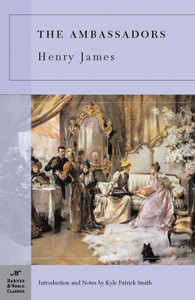Daisy Miller and Washington Square, by Henry James, is part of the Barnes & Noble Classics series, which offers quality editions at affordable prices to the student and the general reader, including new scholarship, thoughtful design, and pages of carefully crafted extras. Here are some of the remarkable features of Barnes & Noble Classics:
New introductions commissioned from today's top writers and scholars Biographies of the authors Chronologies of contemporary historical, biographical, and cultural events Footnotes and endnotes Selective discussions of imitations, parodies, poems, books, plays, paintings, operas, statuary, and films inspired by the work Comments by other famous authors Study questions to challenge the reader's viewpoints and expectations Bibliographies for further reading Indices & Glossaries, when appropriateAll editions are beautifully designed and are printed to superior specifications; some include illustrations of historical interest. Barnes & Noble Classics pulls together a constellation of influencesbiographical, historical, and literaryto enrich each reader's understanding of these enduring works.
Strikingly modern in its psychological insight, social observation and stylistic innovation, Henry Jamess fiction continues to attract and intrigue readers a century after its initial appearance. This volume offers two of his most popular and critically admired novellas: Daisy Miller and Washington Square.
In Daisy Miller, James paints a vivid portrait of a vibrant young American girl visiting Europe for the first time. Lovely, flirtatious, eager for experience, Daisy meets a wealthy American, Mr. Winterbourne, and a penniless but passionate Italian. Her complex encounters with them and others allow James to explore one of his favorite themes, the effect of Americans and Europeans on each other.
Washington Squares Catherine Sloper is Daisy Millers opposite. Neither pretty nor charming, she lives with her wealthy, widowed, tyrannical father, Dr. Austin Sloper, who can barely conceal his disdain for his shy, awkward daughter. When a handsome suitor, Morris Townsend, comes calling, Catherines father refuses to believe he is anything other than a heartless fortune hunter and sets out to destroy her romance.
Jennie A. Kassanoff is Assistant Professor of English at Barnard College. Her articles have appeared in Arizona Quarterly and PMLA. Her book, Edith Wharton and the Politics of Race, is forthcoming from Cambridge University Press.







